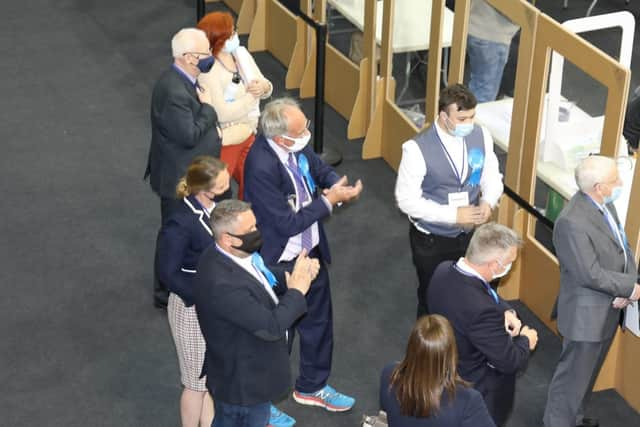Concerns North Northants Tories could appoint their own scrutiny chair against 'longstanding local government tradition'


Concerns have been raised that the Conservative group on the new North Northamptonshire Council (NNC) could appoint its scrutiny committee chairs from inside its own ranks.
Earlier this week, Labour leader Cllr Jean Addison said that they were still waiting to hear whether they would be asked to chair the council's two scrutiny panels. But the new authority's constitution does not include the rule that the chair of scrutiny should be a member of the opposition.
Advertisement
Hide AdAdvertisement
Hide AdAnd this has led to worries that the leader of the Conservative Group Cllr Jason Smithers, expected to be ratified as leader of the council at next Wednesday's inaugural NNC meeting, wants to appoint Conservative councillors to the vital roles.
The whole council will get to vote on the positions at next week's first ever annual general meeting but a large Tory majority means that the preferred candidate of their party leader is likely to get the nod.
The chair of scrutiny is usually appointed from the political opposition and Northamptonshire County Council's most recent scrutiny chair, installed after the authority's financial collapse, was Labour's Mick Scrimshaw, with vice chairs Cllr Chris Stanbra (Lib Dem), Cllr Jim Hakewill (Ind) and Cllr Victoria Perry (Con) taken from across the political spectrum.
Last night, neighbouring Tory West Northamptonshire Council appointed experienced Labour member Cllr Danielle Stone as its scrutiny chair.
Advertisement
Hide AdAdvertisement
Hide AdAll local councils have several scrutiny committees, or commissions, which have the key job of holding the council's executive to account for the decisions they make. Although it is not a legal obligation, scrutiny chairs are usually drawn from an opposition party in order to promote impartiality and independence.


NNC will have a Finance and Resources Scrutiny Committee and a wider Scrutiny Commission.
One former local government democratic services manager told this newspaper that having opposition chairs was a 'longstanding government tradition' and to break with that would be horrifying, adding: "Having an opposition chair is the whole point of the scrutiny committee."
Retired county councillor Mick Scrimshaw was appointed as Chair of the Overview and Scrutiny Committee at Northamptonshire County Council two years ago after the authority went into effective bankruptcy and was publicly praised for his robust effort to turn around scrutiny.
Advertisement
Hide AdAdvertisement
Hide AdHe expressed serious worries over the rumoured proposals. He said: "I'm very concerned that the new constitution allows the administration to take control of these chairs and that it isn't automatically written-in that the opposition will be involved in the leadership of scrutiny.


"My experience at NCC for the past two years was actually really, really good. I think that the councillors who were there probably recognise how scrutiny was changed for the better.
"Max Caller (the government troubleshooter sent into help failing NCC) was very critical of scrutiny at NCC so it was totally changed. We decided to have an opposition chair and vice-chairs from all the political groups and we all worked well together.
"Every political party should have a voice on that committee. We had vice chairs from all the parties and it really worked in that case.
Advertisement
Hide AdAdvertisement
Hide Ad"Now it doesn't always follow that they're going to work well together but if you don't even put them around the table, how will you know?


"We had Conservative councillors really questioning things and that had never happened before.
"Obviously there is political disagreement but what a chair of scrutiny is there for is to try to improve things for everyone. Even if scrutiny doesn't get exactly what it wants, but makes the outcome of decisions a bit better for local people then that's got to be good.
"It makes it a lot harder if we have a political party in charge of scrutiny. What happened in the past is that you had a Tory back bench, nodding along and not questioning.
Advertisement
Hide AdAdvertisement
Hide Ad"The constitution gives them the option to appoint an opposition chair but it doesn't make it automatic.
"I'm hoping that they'll do the right thing.
"As a former chair I think it will be outrageous if they do whip the decision. It will just show you what's going to happen in the future.
"If you look at the final county council meeting, everybody from across the full council was speaking about how scrutiny had improved. I had thought that the lessons had been learned."
The Northants Telegraph believes that Labour group members still hope that Cllr Smithers will relent and allow one of their number to chair the committees.
Advertisement
Hide AdAdvertisement
Hide AdThere is also growing disquiet among several Conservative members who have privately raised concerns that their party needs a clean break from the mistakes made by its predecessor, and that appointing an opposition scrutiny chair would encourage more robust decision-making.
When asked by this newspaper whether any decision on the chairs of scrutiny would be a whipped vote - meaning members are ordered which way to vote - Cllr Smithers said he could not comment because no decisions had yet been made.
He added: "Labour are second guessing on this because none of the committee membership has been published yet.
"Tom Beattie (former CBC Labour leader) was in charge of the constitutional working group (that drew up the rules around scrutiny chairs.)
Advertisement
Hide AdAdvertisement
Hide Ad"The committee makeup will be voted on at the AGM next week and I haven't made any decisions yet on that or on any chairs."
Labour's national standing orders prevent their own council leaders from appointing scrutiny committee chairs, but the Conservatives have no such rules. So, in effect, scrutiny chairs can be selected and pushed through by any Tory-majority council.
As Cllr Danielle Stone was appointed scrutiny chair at West Northamptonshire Council, Conserative councillor James Hill tweeted: "Delighted to see that @WestNorthants will be appointing opposition party member @Dalwahabi (Danielle Stone) as Chair of Scrutiny with @SamRumens as vice. Effective and robust scrutiny will be key to the success of our new Council. Real shame if reports of @NNorthantsC not doing the same are true!"
A 2018 desktop review of scrutiny at Northamptonshire County Council by the respected Centre for Public Scrutiny said that it was 'a function lacking the capacity to change how it works, and to manage in different organisational circumstances'.
Advertisement
Hide AdAdvertisement
Hide AdThe Max Caller best value report in the same year included several scathing indictments of scrutiny at the now-defunct council, saying: "The overall impression that the inspection team gained from all the interviews they undertook on scrutiny was that challenge and criticism was to be discouraged as senior members and officers knew best."
During a 2017 Government review into the effectiveness of local authority overview and scrutiny committees, concerns were raised over how scrutiny chairs were being elected across the country. The Centre for Public Scrutiny told that review: "We have concerns that sometimes chairs can be chosen so as to cause as little disruption as possible for their leaders. It is vital that the role of scrutiny chair is respected and viewed by all as being a key part of the decision-making process, rather than as a form of political patronage."
The committee stopped short of recommending that chairs must be opposition members, but said: "It is clear to us that scrutiny chairs must be seen to be independently minded and take full account of the evidence considered by the committee. We note the evidence from the Minister who outlined the Government’s prescription that chairs of scrutiny in the new mayoral combined authorities must be from a different political party to the executive mayor in order to encourage effective challenge."